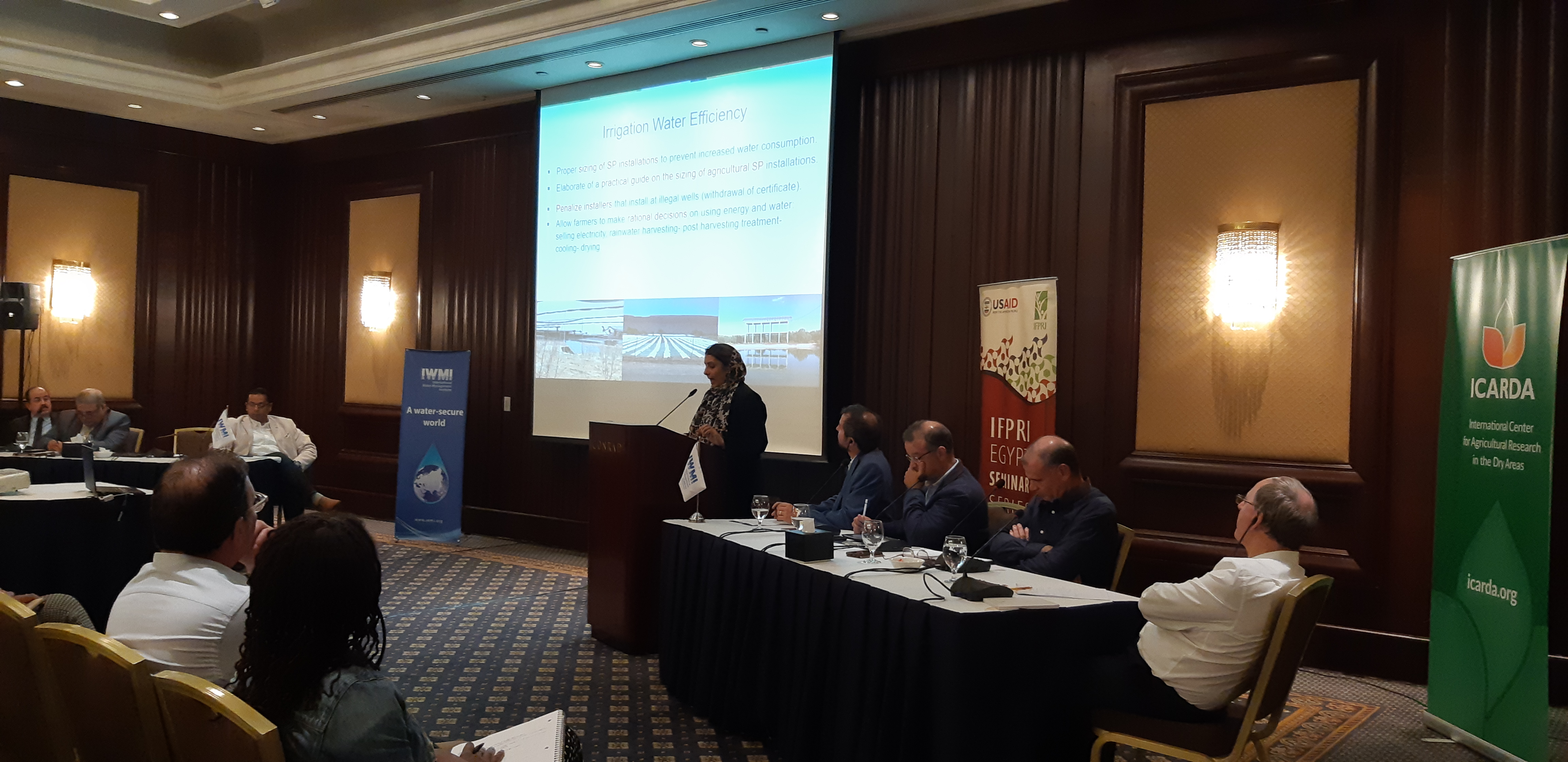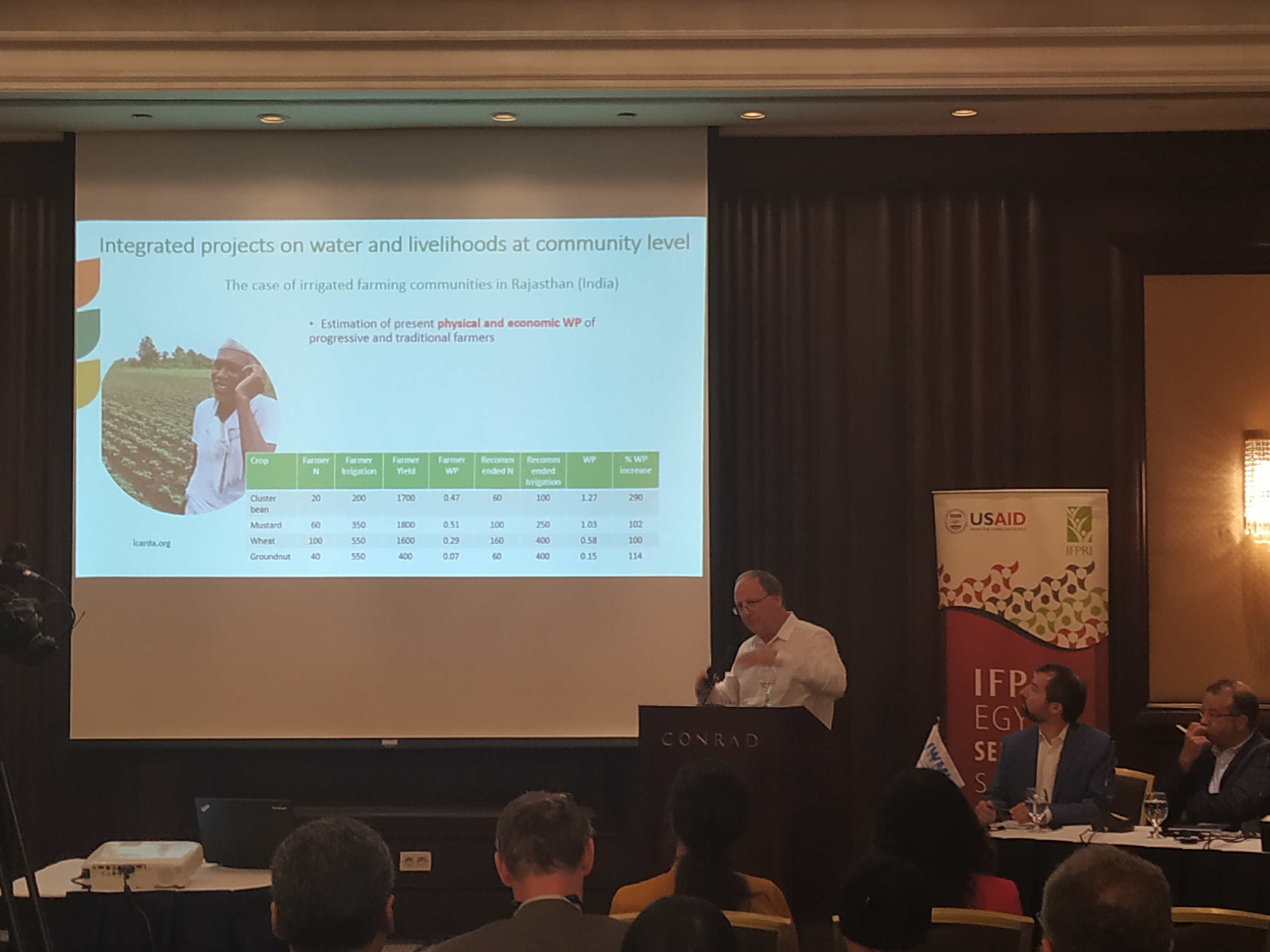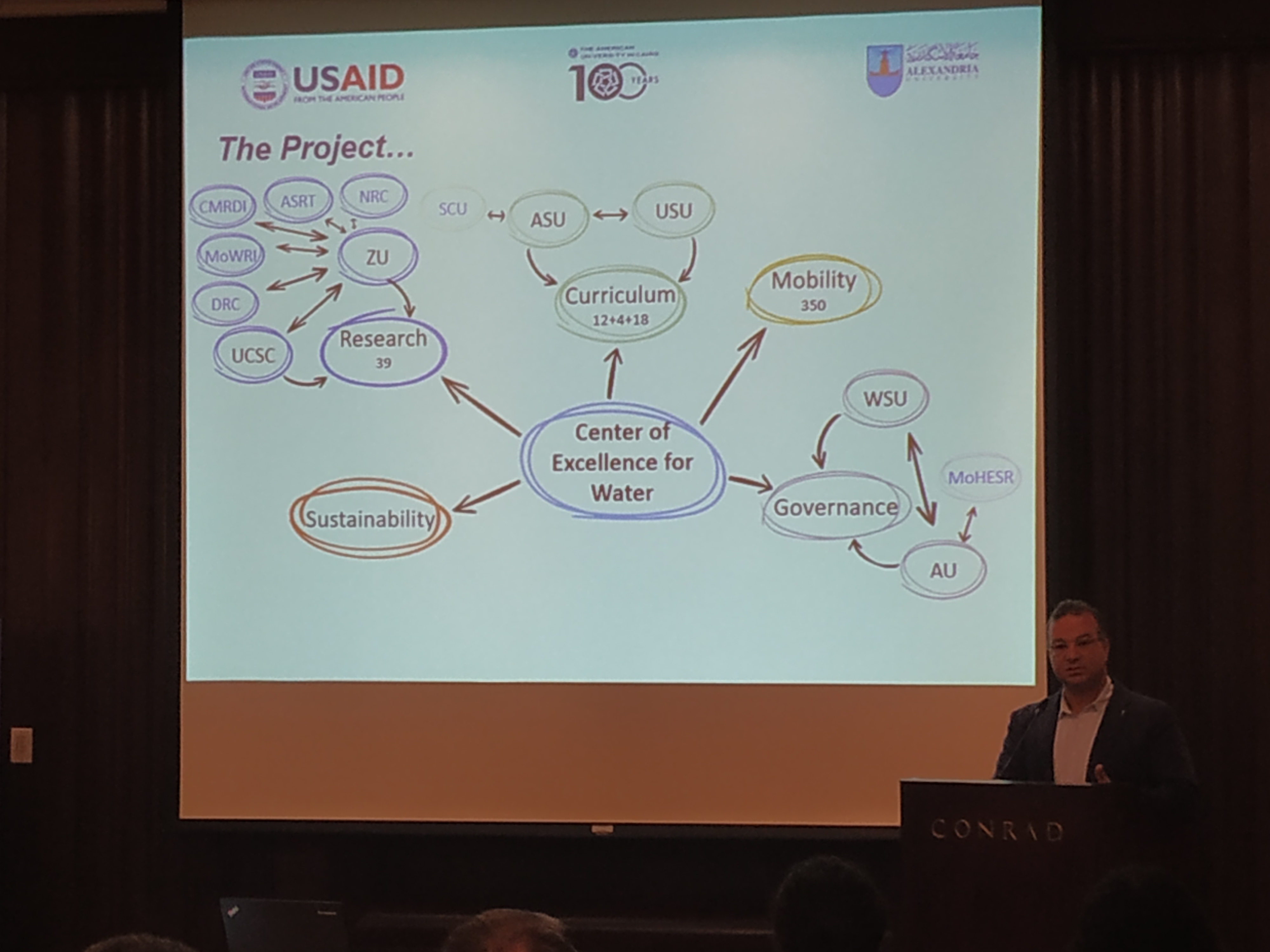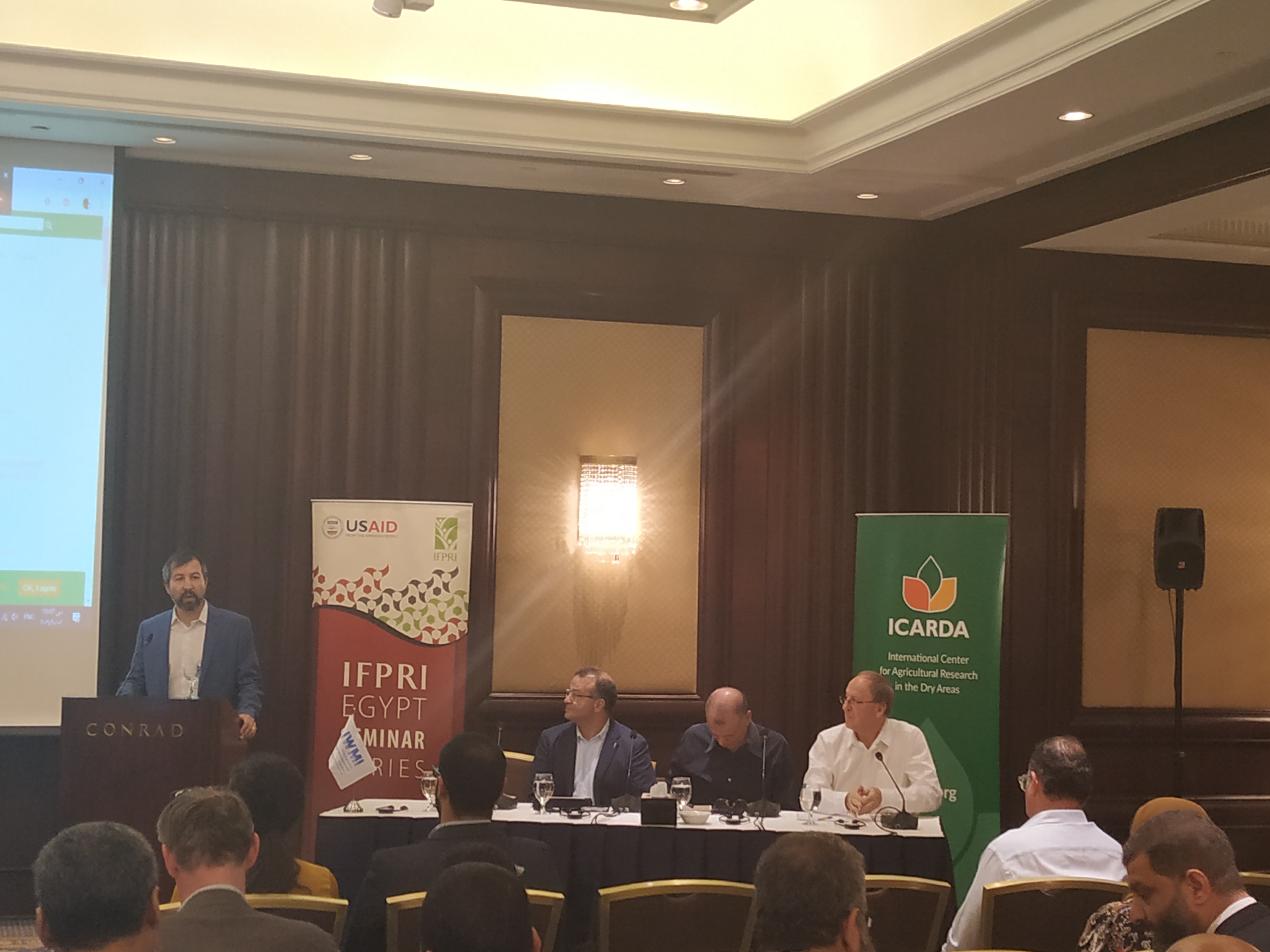Kibrom Abay - IFPRI Egypt
“Options for improving irrigation water efficiency for sustainable agricultural development” seminar took place at the Conrad Hotel on October 02, 2019 as part of IFPRI-Egypt seminar series, funded by the United States Agency for International Development (USAID). The seminar was held in partnership with several CGIAR centers, including the International Water Management Institute (IWMI), the International Center for Agricultural Research in the Dry Areas (ICARDA) and World Fish; as well as with key Egyptian partners, including GIZ, American University Cairo (Center of Excellence for Water), Water and Environment Research Institute and Arab Organization for Agricultural Development.
The seminar aimed at sharing international lessons and discussing ongoing and planned initiatives in Egypt, with emphasis on the role that research can play for a sustainable water security in the country as well as the wider MENA region. Although the speakers focused on different dimensions of water use, all agreed that water scarcity remains a key challenge for agricultural development in the MENA region.

Claudia Ringler, Deputy Director of the Environment and Production Technology Division at IFPRI, highlighted the global threat to future water resources, citing recent projections showing that by 2050 about half of the global population will be affected by water stress. Ringler emphasized that as agriculture consumes much of world’s water resources even a 5-percent reduction (saving) in agricultural water consumption could help the environment and other water users and hence accelerate progress in SDG 6 on water and sanitation. She also proposed several ways to improve water use efficiency, including adoption of modern semi-dwarf and short-duration varieties, drought- and heat-tolerant crops, improving water governance and increasing profits and nutrition from irrigation systems by integrating production systems (e.g., irrigation and fish production).
Amgad Elmahdi, Head of IWMI MENA Office, emphasized that demand for water is increasing while water resources are shrinking. Because of this, many countries in the MENA region are projected to face water stress in the near future. Elmahdi focused on a series of research-based recommendations to improve water productivity and efficiency, including shifting cropping patterns, improving irrigation efficiency and use of non-conventional water resources. Elmahdi further highlighted the importance of improving agricultural productivity (at various levels) to improve water productivity and efficiency. He also highlighted the role of ICT for smart agricultural and improving water productivity at farm level supported by case studies from Ethiopia and Lebanon.
Jacques Wery, Deputy Director General Research at ICARDA, presented different measures of water productivity and the role of crop and management practices on water productivity. Wery highlighted potential trade-offs in these alternative measures of water productivity as well as existing data limitations associated with these measurements. He showed large scale evidence of simultaneous increase of food production and water productivity in Egypt combining water management, crop management and crop rotation. He ended his talk highlighting the importance of shaping policies through improved information of trends, options and trade-offs for improved food production and water productivity and argued that sustainable irrigation agriculture should be ‘‘grounded’’ in production diversity at field, farm and landscape levels.

Ahmed Nasr-Allah, scientist at WorldFish, presented research findings focusing on integrating aquaculture and agriculture in Egypt. His research findings show several benefits and models of integrating aquaculture and agricultural production, which enable suing the same water for fish production and crop irrigation. Nasr-Allah’s research shows that besides improving water productivity by reusing the same water for both aquaculture and crop production, water discharges from fishponds contain more nutrients than freshwater and hence can improve crop yields or reduce fertilizer cost. His experiments show several benefits of integrating fish and irrigation production systems. He finally called for improving experience of multi-use of water in farm level for efficient use of resources.
Nisreen Lahham, Senior Advisor for Sustainable Water Policy at GIZ, and Coordinator of the Nexus Dialogue Programme- MENA region, presented findings from empirical studies on impacts of Solar Powered Irrigation Systems (SPIS) in Morocco and Tunisia. She discussed the benefits of SPIS in terms of reducing cost of production and mitigating the impact of climate change. On the other side, she highlighted the risks of over extracting ground water through using SPIS. Her research findings highlighted knowledge gaps among farmers’ water usage and water productivity. Lahham’s concluding remarks reinforce the need to design policy instruments and incentives that can encourage adoption of SPIS, while ensuring water efficiency, and governing the use of ground water. She also proposed a more integrated approach to address, water, energy and food security; a Nexus approach.
Yasser Elshayeb, the Chief of Party of the Center of Excellence for Water, a Professor at the American University in Cairo (AUC), introduced the Center of Excellence for Water, a new initiative funded by the USAID involving a consortium of American and Egyptian universities. He pointed out that despite the centrality of water for our livelihoods and the looming water scarcity issues in the region, we lack trained personnel, and experts specializing in all fields of water. This center of excellence aims to fill this gap by investing in developing curriculum, funding research and building capacities of young generations to create future water experts. The center is implanted at Alexandria University, with the AUC as project coordinator.

Alaa El Bably, Director of Soils, Water and Environment Research Institute, reinforced that ensuring sustainable water security requires urgent actions, commitments and investments from all stakeholders and policy makers. In particular, El Bably justifies the rationale for regular assessment and monitoring of the current state of water-use efficiency and productivity using various performance indicators, including water accounting approaches.
Kamel Amer, Head of the Middle Region Office, Arab Organization for Agricultural Development (AOAD), reiterated the relative water scarcity in the Arab League, a region inhabited by about 5 percent of the world population with a renewable water resource not exceeding 0.5 percent of world water resource. Amer emphasized that as agriculture and irrigation consume much of freshwater resources in the region, countries need to invest in improving water productivity, which could be accomplished, by modernizing irrigations systems.
However, the decision of where to apply modern irrigation technologies depends on many criteria. Advanced irrigation technologies do not necessarily save water or increase water productivity. The key technical recommendations for improving water use efficiency and productivity in the region include:
- Modernize irrigation systems to improve irrigation efficiency in areas where scarcity is severe and savings can be achieved through combining modernization with changes in water allocation
- Improve agricultural productivity (e.g., by adopting high-yielding crops and closing the yield gap through enhanced pest, disease, weed and soil management)
- Shift cropping patterns (e.g., to drought tolerant and water saving crops, or to diversified crop rotations)
- Develop integrated production systems (e.g., aquaculture and agriculture)
- Integrate across the water, energy and food nexus to jointly improve the productivity of water, land and energy resources
- Consider increased use of non-conventional water sources (e.g., treated wastewater)
- Consider integrated (multi-scale and multi-criteria) approaches and actions
Additional policy related recommendations include:
- Raise awareness and empower water users (information on the seriousness of water scarcity)
- Introduce appropriate policies to improve water governance and support water saving crops and techniques
- Design incentives and instruments to improve water productivity and reduce water wastage
- Reform water and land policies to improve investments in land and water resources

